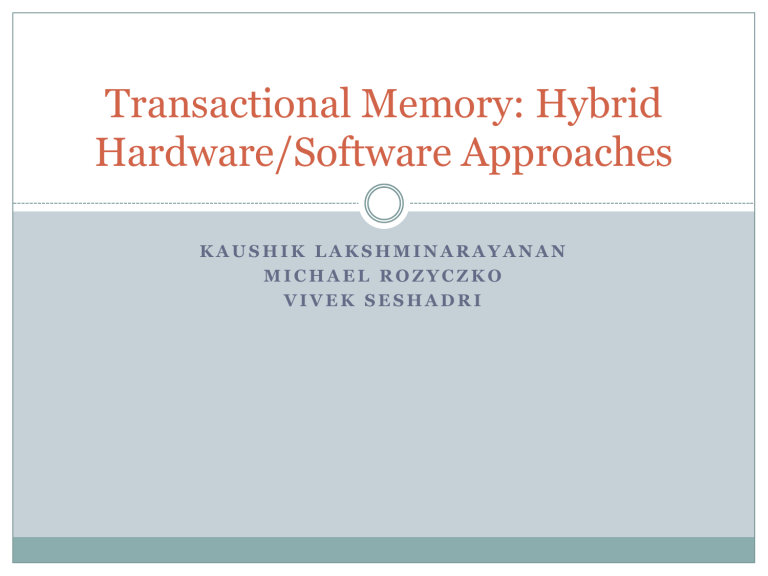Transactional Memory: Hybrid Hardware/Software Approaches

Transactional Memory: Hybrid
Hardware/Software Approaches
K A U S H I K L A K S H M I N A R A Y A N A N
M I C H A E L R O Z Y C Z K O
V I V E K S E S H A D R I
Transactional Memory
Lock-free data structures
Atomic code sections
Abstraction – what instead of how
Ideas from database community
Means a lot to parallel programming
Hardware vs Software TM
Hardware Transactional Memory (HTM)
Modify cache coherence protocol, ISA extensions
Best-effort (bounded resources)
Transactions cannot exceed processor resources
UTM (unbounded resources)
Supports large transactions – hard to realize
Software Transactional Memory (STM)
Software bookkeeping
Overhead
Hybrid Transactional Memory (?)
Combine benefits of both models
Hybrid TM Design Issues
Naming
Hardware support
Software mechanism
Policy
ISA extensions
Other issues
HyTM Overview
HyTM
Peter Damron, Alexandra Fedorova, Yossi Lev, Victor
Luchangco, Mark Moir and Daniel Nussbaum
HyTM Library
Best-effort
HTM
STM
Overview of Implementations II
RTM
Arvindh Shriraman, Michael F. Spear, Hemayat Hossain,
Virendra J. Marathe, Sandhya Dwarkadas and Michael L. Scott
Application Handler
HTM
Overview of Implementations III
SigTM
Chi Chao Minh, Martin Trautmann, JaeWoong Chung, Austen
McDonald, Nathan Bronson, Jared Casper, Christos Kozyrakis,
Kunle Olukotun
STM
Hardware
Bookkeeping
(Signatures)
Hardware Support/Software Mechanisms
HyTM
Does not assume any hardware support
Runs on existing HTM (if one exists)
Full-fledged STM library
Object records (for every word in memory)
Meta-information about the state of the word
Handlers
Conflict management
Hardware/Software interface
Hardware Support/Software Mechanisms
RTM
Cache coherence protocol modifications – TMESI
Additional registers (transaction metadata)
Application-specific handlers
Conflict detection
Aborted hardware transactions
Hardware Support/Software Mechanisms
SigTM
Hardware signatures (bookkeeping)
Bloom filter
User-level configuration registers (policy)
Slight modification to cache coherence
Hardware check on signature hits
Software handlers to handle hits (based on policy)
Software write-set bookkeeping
Required to update on successful commit
Policy
Upon conflict/eviction, something must be done to resolve the situation
Conflict detection – write-read, write-write
When to do conflict detection? Eager/Lazy
What to do when conflict encountered? Which to abort.
Retrying aborted transactions
Immediate retry vs. back off
HyTM – hardware vs. software transaction
SigTM – API policy management
RTM Policy
RTM – flexible policy
Application-specific handlers
Speculative execution
Application can decide to allow read-write and write-write
Programmable Data Isolation (PDI)
Can configure exclusivity of data
Alert on Update (AOU)
Inform application when a conflict/eviction occurs
ISA extensions
Hybrid TM generally use special instructions to interface compiler and TM hardware
Instructions to delimit beginning and ending of transactions
(Most implementations)
Instructions to set application-specific handlers (RTM)
Instructions to check whether the hardware can read or write
(HyTM)
Update the signatures of addresses (SigTM)
Other Issues
False sharing
Cache lines – unwanted abort and retries
Unnecessarily shared variables
Collecting statistics
Memory allocation/Freeing
Malloc and free in aborted transactions
Deadlocks
Issue with lock based mechanisms
Strong isolation and ordering
Interaction with non-transactional writes
Transactional Memory: Hybrid
Hardware/Software Approaches
K A U S H I K L A K S H M I N A R A Y A N A N
M I C H A E L R O Z Y C Z K O
V I V E K S E S H A D R I

